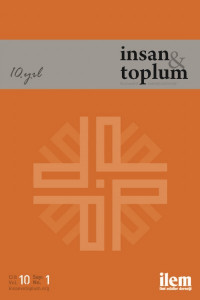Abstract
Bu makale, göçmenin, asli-menşe olarak gördüğü mekânla ve cemaatle sürdürmeye çalıştığı aidiyet ve bağlılık ile ilgilidir. Klasik göç literatürü, göçmenlerin asli-menşe yerden hedef-menzil yere gidişlerinin bir kopuşa ve terk edişe denk geldiğini savunagelmiştir. Buna karşın bu araştırmada da öne sürüldüğü üzere göçmenler vaktiyle muhtelif sebeplerle gittikleri ve yerleştikleri hedef-menzil mekânlarda, o mekânların gerektirdiği hâl, tavır ve eylemle hayatlarını sürdürürlerken asli-menşe mekânla bağlarını koparmamakta hatta o mekânları hedef alan geri yönlü bir göç hareketliliğine de girişmektedirler. Ancak bu göçmen için geri dönmek çoğunlukla birden fazla mekânı kapsayan yerleşim biçiminde kent ve kır hayatının sürdürülmesine denk gelmektedir. Bu yer yer kişisel bağlılıklar ve nostalji ihtiyacını karşılamada yer yer de bu bağlılığı arkadan gelen nesle devir motivasyonunu canlı tutmada kullanılmaktadır. Böylelikle geriye dönüşler çoğu kez kesin bir dönüşten ziyade asli olarak görülen toprağın ve cemaatin zihnen unutulamadığı, terk edilemediği ve çoklu mekân pratiğinde yaşatılmaya çalışıldığı bir göç hareketliliğine denk gelmektedir. Bu minvalde bireyler çoğu kez kendileri ve aileleri adına kesin kararlar almaktan geri durmakta ve mekânlara aidiyet bakımından “son durak yok” tavrı takınmaktadırlar. Göçmenin bu tecrübesi, Bauman’ın “akışkan modernlik” tabirine benzemekte ve bu araştırma kapsamında “son durağı olmayan” hayat algıları olarak gözlemlenen sosyalizasyon sürecine denk gelmektedir. Buna göre kırsal göç sona eren değil devam eden bir sürecin karşılığı olmaktadır. Yine bu tecrübe, Weber’in tabiriyle değer yönelimli akılcılığa da yakın bir konum teşkil etmekte, bireyin karar verme süreçleri, modernliğin öngördüğü doğrusal ve analitik rasyonelliğin ya da fayda-maliyetin ötesinde akılcılık ve akıl dışılığın arasında göçmen tarafından fedakârlıkların gerçekleştirilmesi ile mümkün hâle gelmektedir. Bu çalışma, kırsal göçmenin son durağı olmayan ve rasyonel birey tercihiyle açıklanamayan bu geriye göç tecrübesini, Rizeli kırsal göçmenin geriye dönüş hikâyesinin realist bir metodolojik incelemesiyle ele almaktadır.
References
- Al-Ali, N. ve Koser, K. (2002). New approaches to migration?: Transnational communities and the transformation of home. Londra ve New York: Routledge.
- Alkan, M. N. (2011). Yeni bir fenomen olarak çift yönlü göç. F. Şen (Ed.). 50. yılında göç içinde (ss.180-193). Ankara: Kültür ve Turizm Bakanlığı.
- Bartram, D., Poros, M. V. ve Monforte, P. (2017). Göç meselesinde temel kavramlar. I. Ağabeyoğlu-Tuncay (Çev.). Ankara: Hece Yayınları.
- Bauman, Z. (2017). Akışkan modernite. S. O. Çavuş (Çev.). İstanbul: Can Yayınları.
- Berger, J. ve Mohr, J. (2018). Yedinci adam: Avrupa’da bir göçmen işçinin hikâyesi. Cevat Çapan (Çev.). İstanbul: Metis Yayınları.
Abstract
This article is concerned with the belonging and loyalty tried to be maintained by the migrant towards the place and society they consider as the true origin. The traditional migration literature has retrospectively argued that the migrant’s moving from the place of origin to the targeted place corresponds to a discontinuity and abandonment. On the other hand, as suggested in this research, the migrants maintain their lives in the target place through complying with the behaviors, attitudes and actions required by those spaces; they do not break their ties with the original place of origin and even engage in a backward movement. However, the return of these migrants often coincides with the continuation of urban and rural life in the form of a multi-site settlement. This is sometimes used to meet the need for personal loyalties and nostalgia, and sometimes for keeping the motivation of passing it down to next generation alive. In this way, rather than a definite turn, the returns often correspond to a migration movement in which the place and society of origin cannot be mentally forgotten and abandoned, and comes to be endeavored to be survived in the practice of multiple spaces. In this sense, individuals often refrain from making definite decisions on behalf of themselves and their families. This experience of the migrant corresponds to the socialization process described as “liquid modernity” by Bauman and observed as life perceptions “without a last stop” within the scope of this research. Accordingly, rural migration is the equivalent of a continuous process, not an ending one. This experience constitutes a close position to the value-oriented rationalism in Weber’s words; the decision making processes of an individual becomes possible by self-sacrifices made by the migrant between rationalism and irrationalism or beyond cost-benefit or linear and analytical rationalism foreseen by modernism. This research deals with the rural migrant’s experience of returning back, which doesn’t have a last stop and cannot be explained with a rational individual preference, through a realistic and methodological analysis of the story of rural migrant from Rize returning back.
Keywords
Migration return migration ethical substantive rationality liquid modernity multiple place practice
References
- Al-Ali, N. ve Koser, K. (2002). New approaches to migration?: Transnational communities and the transformation of home. Londra ve New York: Routledge.
- Alkan, M. N. (2011). Yeni bir fenomen olarak çift yönlü göç. F. Şen (Ed.). 50. yılında göç içinde (ss.180-193). Ankara: Kültür ve Turizm Bakanlığı.
- Bartram, D., Poros, M. V. ve Monforte, P. (2017). Göç meselesinde temel kavramlar. I. Ağabeyoğlu-Tuncay (Çev.). Ankara: Hece Yayınları.
- Bauman, Z. (2017). Akışkan modernite. S. O. Çavuş (Çev.). İstanbul: Can Yayınları.
- Berger, J. ve Mohr, J. (2018). Yedinci adam: Avrupa’da bir göçmen işçinin hikâyesi. Cevat Çapan (Çev.). İstanbul: Metis Yayınları.
Details
| Primary Language | Turkish |
|---|---|
| Subjects | Sociology |
| Journal Section | Research Articles |
| Authors | |
| Publication Date | March 15, 2020 |
| Published in Issue | Year 2020 Volume: 10 Issue: 1 |

